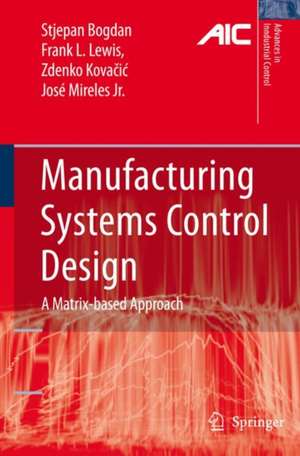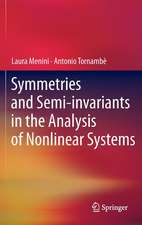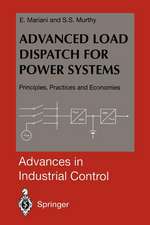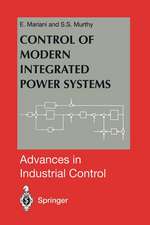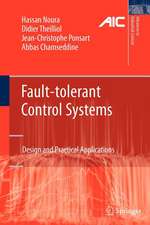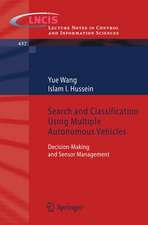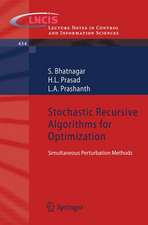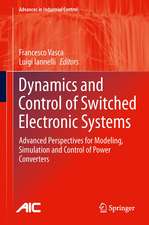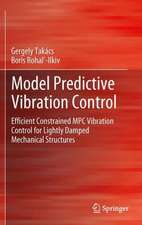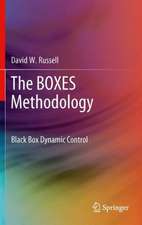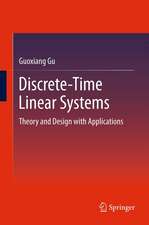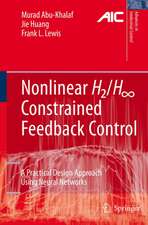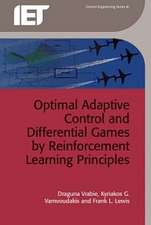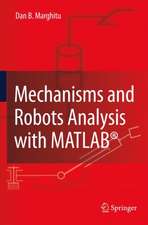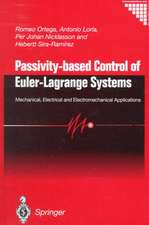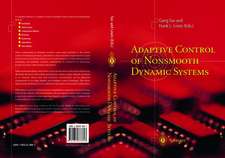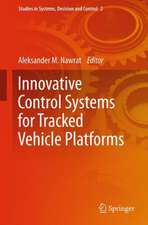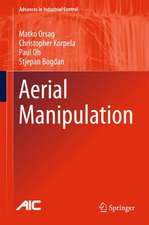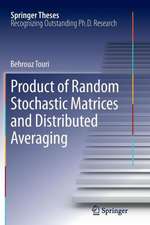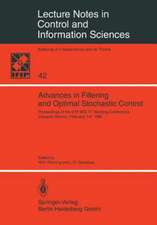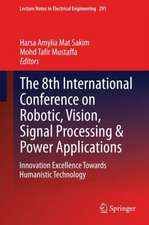Manufacturing Systems Control Design: A Matrix-based Approach: Advances in Industrial Control
Autor Stjepan Bogdan, Frank L. Lewis, Zdenko Kovacic, Jose Mirelesen Limba Engleză Hardback – 8 mai 2006
| Toate formatele și edițiile | Preț | Express |
|---|---|---|
| Paperback (1) | 945.79 lei 6-8 săpt. | |
| SPRINGER LONDON – 15 dec 2010 | 945.79 lei 6-8 săpt. | |
| Hardback (1) | 953.20 lei 6-8 săpt. | |
| SPRINGER LONDON – 8 mai 2006 | 953.20 lei 6-8 săpt. |
Din seria Advances in Industrial Control
- 15%
 Preț: 643.34 lei
Preț: 643.34 lei - 23%
 Preț: 582.63 lei
Preț: 582.63 lei - 18%
 Preț: 783.98 lei
Preț: 783.98 lei - 18%
 Preț: 947.35 lei
Preț: 947.35 lei - 20%
 Preț: 568.24 lei
Preț: 568.24 lei - 15%
 Preț: 643.16 lei
Preț: 643.16 lei - 18%
 Preț: 899.21 lei
Preț: 899.21 lei - 18%
 Preț: 891.33 lei
Preț: 891.33 lei - 18%
 Preț: 740.57 lei
Preț: 740.57 lei - 18%
 Preț: 961.23 lei
Preț: 961.23 lei - 18%
 Preț: 955.08 lei
Preț: 955.08 lei - 15%
 Preț: 645.28 lei
Preț: 645.28 lei - 15%
 Preț: 638.43 lei
Preț: 638.43 lei - 18%
 Preț: 901.11 lei
Preț: 901.11 lei - 18%
 Preț: 1410.94 lei
Preț: 1410.94 lei - 18%
 Preț: 728.91 lei
Preț: 728.91 lei - 20%
 Preț: 1003.78 lei
Preț: 1003.78 lei - 18%
 Preț: 947.35 lei
Preț: 947.35 lei - 15%
 Preț: 643.34 lei
Preț: 643.34 lei - 15%
 Preț: 654.30 lei
Preț: 654.30 lei - 18%
 Preț: 950.52 lei
Preț: 950.52 lei - 15%
 Preț: 644.30 lei
Preț: 644.30 lei - 18%
 Preț: 1393.09 lei
Preț: 1393.09 lei - 18%
 Preț: 950.21 lei
Preț: 950.21 lei - 18%
 Preț: 949.90 lei
Preț: 949.90 lei - 18%
 Preț: 949.42 lei
Preț: 949.42 lei - 18%
 Preț: 950.52 lei
Preț: 950.52 lei - 18%
 Preț: 1113.71 lei
Preț: 1113.71 lei - 15%
 Preț: 650.04 lei
Preț: 650.04 lei - 15%
 Preț: 644.95 lei
Preț: 644.95 lei - 18%
 Preț: 950.33 lei
Preț: 950.33 lei - 18%
 Preț: 948.61 lei
Preț: 948.61 lei - 18%
 Preț: 1112.60 lei
Preț: 1112.60 lei - 15%
 Preț: 644.63 lei
Preț: 644.63 lei - 18%
 Preț: 953.20 lei
Preț: 953.20 lei - 18%
 Preț: 945.62 lei
Preț: 945.62 lei - 15%
 Preț: 640.88 lei
Preț: 640.88 lei - 15%
 Preț: 640.88 lei
Preț: 640.88 lei - 20%
 Preț: 650.92 lei
Preț: 650.92 lei - 18%
 Preț: 1112.60 lei
Preț: 1112.60 lei - 20%
 Preț: 998.36 lei
Preț: 998.36 lei - 15%
 Preț: 643.34 lei
Preț: 643.34 lei - 18%
 Preț: 948.92 lei
Preț: 948.92 lei - 18%
 Preț: 1381.43 lei
Preț: 1381.43 lei - 15%
 Preț: 651.51 lei
Preț: 651.51 lei - 15%
 Preț: 647.08 lei
Preț: 647.08 lei - 20%
 Preț: 563.66 lei
Preț: 563.66 lei - 18%
 Preț: 992.64 lei
Preț: 992.64 lei - 18%
 Preț: 1225.79 lei
Preț: 1225.79 lei
Preț: 953.20 lei
Preț vechi: 1162.43 lei
-18% Nou
Puncte Express: 1430
Preț estimativ în valută:
182.42€ • 189.74$ • 150.60£
182.42€ • 189.74$ • 150.60£
Carte tipărită la comandă
Livrare economică 14-28 aprilie
Preluare comenzi: 021 569.72.76
Specificații
ISBN-13: 9781852339821
ISBN-10: 1852339829
Pagini: 324
Ilustrații: XXI, 298 p.
Dimensiuni: 155 x 235 x 21 mm
Greutate: 0.67 kg
Ediția:2006
Editura: SPRINGER LONDON
Colecția Springer
Seria Advances in Industrial Control
Locul publicării:London, United Kingdom
ISBN-10: 1852339829
Pagini: 324
Ilustrații: XXI, 298 p.
Dimensiuni: 155 x 235 x 21 mm
Greutate: 0.67 kg
Ediția:2006
Editura: SPRINGER LONDON
Colecția Springer
Seria Advances in Industrial Control
Locul publicării:London, United Kingdom
Public țintă
ResearchCuprins
Discrete Event Systems.- Matrix Model and Control of Manufacturing Systems.- Matrix Methods for Manufacturing Systems Analysis.- Manufacturing System Structural Properties in Matrix Form.- Petri Nets.- Virtual Factory Modeling and Simulation.
Recenzii
From the reviews:
"The authors present matrix models which are based on recent research. … The book is completed by an report on other simulation tools for virtual factory modeling. From this together with two introductory chapters on flexible manufacturing systems and on discrete event systems, a self-contained monograph resulted. It is well readable for engineers and also for mathematicians interested not only in such applications but especially in this type of matrix algebra." (Inge Troch, Zentralblatt MATH, Vol. 1118 (20), 2007)
"This book focuses on flexible manufacturing systems (FMSs) and the authors’ matrix-based supervisory control design method. … The book’s mathematical level makes it suitable for a graduate course. … The authors have clearly shown how to build their matrix-based models from standard manufacturing data and have demonstrated through numerous physical testbeds the effectiveness of their approach. … The authors have set a new and promising course for the theory and practice of modeling and control of automated manufacturing systems." (Alan A. Desrochers, International Journal of Robust and Nonlinear Control, Vol. 19, July, 2009)
"The authors present matrix models which are based on recent research. … The book is completed by an report on other simulation tools for virtual factory modeling. From this together with two introductory chapters on flexible manufacturing systems and on discrete event systems, a self-contained monograph resulted. It is well readable for engineers and also for mathematicians interested not only in such applications but especially in this type of matrix algebra." (Inge Troch, Zentralblatt MATH, Vol. 1118 (20), 2007)
"This book focuses on flexible manufacturing systems (FMSs) and the authors’ matrix-based supervisory control design method. … The book’s mathematical level makes it suitable for a graduate course. … The authors have clearly shown how to build their matrix-based models from standard manufacturing data and have demonstrated through numerous physical testbeds the effectiveness of their approach. … The authors have set a new and promising course for the theory and practice of modeling and control of automated manufacturing systems." (Alan A. Desrochers, International Journal of Robust and Nonlinear Control, Vol. 19, July, 2009)
Notă biografică
The authors of this project are or have been associated with Frank Lewis’s research group in Texas, Frank Lewis himself is very well-known in the control community having served as Editor for Automatica and as a conference organizer for IEEE (for example, he was General Chair of CDC 2003), of which he is a fellow. All the authors have experience in both the industrial and academic spheres including work on various forms of control, robotics, MEMS and network installation. Frank Lewis has extensive experience of writing books (11 books still in print including 6 authored monographs/textbooks). He has edited a previous Springer volume Adaptive Control of Nonsmooth Dynamic Systems 1-85233-384-7. Professor Kovacic and Doctor Bogdan are also involved in IEE conference organisationand in addition to their American connections are in close collaboration with the highly-regarded Technical University of Crete.
Textul de pe ultima copertă
Manufacturing Systems Control Design details a matrix-based approach to the real-time application of control in discrete-event systems and flexible manufacturing systems (FMS) in particular. The "and/or" algebra in which matrix operations are carried out enables fast and efficient calculations with a minimum of computing power. In addition, the method uses standard task-sequencing and resource-requirements matrices which, if not in use already, can be easily derived with the help of this text. Matrix-based techniques are compared with Petri net and max-plus algebra ideas.
Virtual modeling of complex physical systems has brought a new perspective to the investigation of phenomena in FMS. The software discussed in this book(and downloadable from the authors’ website at http://flrcg.rasip.fer.hr/) supplies the reader with a graphical user interface that can do many things to make the design and control of FMS easier.
The examples presented herein tackle the real-world problems faced by engineers trying to put into practice methods developed in academia, bringing together catholic experience of sensors, control systems, robotics, industrial automation, simulation, agile assembly and supply chains. Common concerns confronted include:
• predictability: issues of control system modeling and analysis are addressed;
• producibility: by looking at the design and synthesis of cellular workcells;
• productivity: in terms of dynamic sensing and control.
Covering all the steps from identification of operations and resources through modeling of the system and simulation of its dynamics in a virtual environment to the transformation of those models into real-world algorithms, this monograph is a sound practical basis for the design of controllers for manufacturing systems. It will interest both the academic and practising control or manufacturing engineer wishing to enhance the control of flexible systems andoperations researchers looking at manufacturing performance. The end-of-chapter exercises provided and the easy-to-read introduction to the subject will also suit the final-year undergraduate and the beginning graduate in these disciplines.
Advances in Industrial Control aims to report and encourage the transfer of technology in control engineering. The rapid development of control technology has an impact on all areas of the control discipline. The series offers an opportunity for researchers to present an extended exposition of new work in all aspects of industrial control.
Virtual modeling of complex physical systems has brought a new perspective to the investigation of phenomena in FMS. The software discussed in this book(and downloadable from the authors’ website at http://flrcg.rasip.fer.hr/) supplies the reader with a graphical user interface that can do many things to make the design and control of FMS easier.
The examples presented herein tackle the real-world problems faced by engineers trying to put into practice methods developed in academia, bringing together catholic experience of sensors, control systems, robotics, industrial automation, simulation, agile assembly and supply chains. Common concerns confronted include:
• predictability: issues of control system modeling and analysis are addressed;
• producibility: by looking at the design and synthesis of cellular workcells;
• productivity: in terms of dynamic sensing and control.
Covering all the steps from identification of operations and resources through modeling of the system and simulation of its dynamics in a virtual environment to the transformation of those models into real-world algorithms, this monograph is a sound practical basis for the design of controllers for manufacturing systems. It will interest both the academic and practising control or manufacturing engineer wishing to enhance the control of flexible systems andoperations researchers looking at manufacturing performance. The end-of-chapter exercises provided and the easy-to-read introduction to the subject will also suit the final-year undergraduate and the beginning graduate in these disciplines.
Advances in Industrial Control aims to report and encourage the transfer of technology in control engineering. The rapid development of control technology has an impact on all areas of the control discipline. The series offers an opportunity for researchers to present an extended exposition of new work in all aspects of industrial control.
Caracteristici
Equips the reader with a practical paradigm for the implementation of control in large-scale manufacturing systems Does not require excessive computing power or overcomplicated algorithms Assimilates knowledge from relevant disciplines in flexible manufacturing Shows how to develop final control systems that take account of the system as a whole, not simply the mechanical part which makes the product
